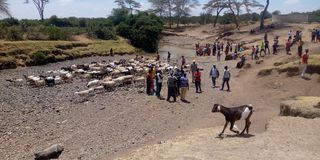Laikipia large-scale farmers accused of diverting rivers into farms

Women draw stagnant coloured water for domestic consumption on a section where River Ewaso Ng'iro has dried up at Ngareng'iro village, Laikipia East Sub-county. Residents have given the Water Resources Authority (WRA) three days to close down private illegal water intakes upstream or they walk and destroy them.
A week after the government imposed a temporary ban on irrigation to allow uninterrupted river flows, residents in lower parts of Laikipia County are up in arms, accusing the Water Resources Authority (WRA) of sleeping on the job.
Those affected by the drying up of rivers are now threatening to march upstream and destroy all water intakes where water is being diverted for irrigation.
“We are giving WRA officials three days to order farmers to release the water and allow the river to flow, failure to which we shall walk there and destroy these intakes,” said Mr Mawira Mutembei about the drying up of River Ewaso Ng’iro at Ngareng’iro Shopping Centre.
Top officials from the Ministry of Water visited Laikipia County last week regarding water-related conflicts and promised the community that the river would start flowing downstream following the ban imposed on irrigation.
Eng Mohamed Shurie, WRA Chief Executive Officer while delivering a speech from Water and Irrigation Principal Secretary blamed illegal water abstraction for the drying of rivers flowing from Mt Kenya and Aberdare forests.
Incidentally, on that particular day when top Government officials visited Mwireri village in Laikipia East Sub-county, water was flowing on the previously dry riverbeds with the residents pointing to collusion between some WRA officials and commercial farmers.

Residents of Ngareng'iro village in Laikipia East Sub-County turn away a flock of sheep and goats that had been driven to a watering point on a dry section of River Ewaso Ng'iro.
Despite the assurance from the WRA boss, water flowed on the rivers for just two days before reverting to the previous situation, a situation that has now seen a rise in cases of human/wildlife conflicts.
In parts of the Daiga division, residents are living in fear of attacks by elephants and other wild animals straying from Lolldaiga Conservancy in search of water following the drying up of rivers Nanyuki, Nyaregeno, Timau and Sirimon.
“Every night and early in the morning, we are witnessing herds of elephants converging at the few privately owned boreholes attracted by the smell of water. They are not only posing danger to school children but have also destroyed water tanks and crops growing under irrigation,” said Mr Nahashon Kana, a resident of Muramati village which borders Lolldaiga Conservancy.
Elected leaders have weighed in on the unfolding water crisis pitting upstream residents against those downstream and are now calling on WRA to work closely with police officers to enforce laid-down regulations governing the use of river water in times of drought.
“Those diverting water into their farms are breaking the law and should be arrested and prosecuted. If they are not stopped, we shall be courting trouble that could lead to clashes between the farmers upstream and pastoralists downstream,” said Laikipia Governor Joshua Irungu.
Segera Ward MCA Salim Edong claimed that some WRA officials had been compromised by large-scale farmers saying this was the reason why River Ewaso Ng’iro had for the last two months stopped flowing past a private water intake located inside a horticultural farm.
Mr Irungu said in the wake of a biting water shortage, the devolved unit has started water trucking services to public institutions and in the villages has reached out to other partners to assist in rehabilitation of boreholes.
“We have engaged partners like Unicef and submitted a request for rehabilitation of various boreholes, especially in the worst hit areas. The National Drought Management Authority (NDMA) has committed to rehabilitating six boreholes as well as providing fuel for water tracking.





